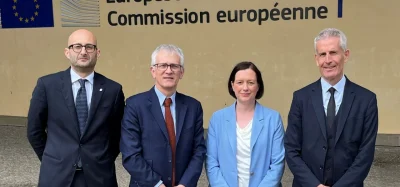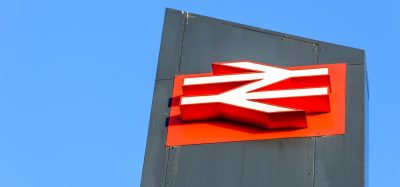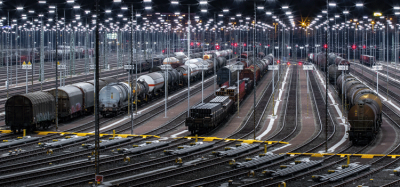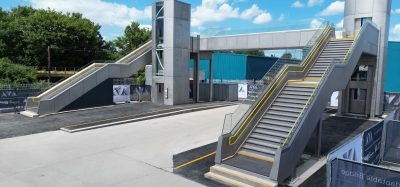Q&A with the UIC’s Lucie Anderton: Delivering Sustainable Railways
Posted: 15 March 2023 | Lucie Anderton | No comments yet
For the inaugural edition of Global Railway Review’s exclusive Delivering Sustainable Railways feature series, Lucie Anderton, the UIC’s Head of Sustainability, talks about the importance of sustainability – not just for the UIC – but for the future of rail as the backbone of sustainable mobility.
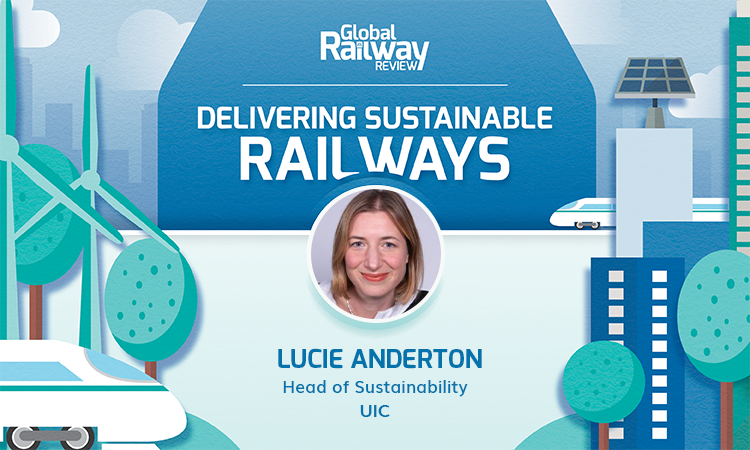

Can you talk about the importance of sustainability for the International Union of Railways (UIC)?
The UIC has long been working with members on technical topics of sustainability, beginning with energy saving and emissions, as a core challenge area where our members seek to work together to solve problems and share lessons. Today, we work on an ever-increasing range of subjects with increasing participation from members across the world, so sustainability is important to us because it is a priority for our members. The world’s railways are committed to getting ever better at running a truly sustainable service, something that all stakeholders, especially customers and passengers, are demanding.
Of course, the most important thing that the railways can offer for a more sustainable future is indeed to move more passengers and goods, reducing the amount of truck, car and aeroplane trips being taken. In fact, rail use must grow by more than 40% by 2030 to be on track to achieving the Paris Agreement’s Objectives. Over the last decade around only 6-7% of passenger journeys were made by rail, this potential for avoided CO2 must be more actively exploited. For the UIC it is important for us to advocate for the policy support and investment to help expand and improve the worlds railways, helping them to connect and move more people and businesses.
What are some of the latest sustainability projects that the UIC have been working on?
The list of sustainability projects we are working on is getting longer every year! We started working on energy decades ago, and today, in the Sustainability Platform, we now actively work in noise and vibration, air quality, biodiversity and circular economy. For example, the ReVeRsE project published guidelines in 2022 on better managing railway land for better biodiversity outcomes and a second report is due to be released soon. Biodiversity is a growing area for railways, and there is much to learn from each other to strengthen our expertise on this subject. Our Noise and Vibration group is very active, they are about to publish studies on noise from stationary trains and on nuisance effects on neighbours; the Low Noise Pad Project has had some very interesting site tests this past year as we work to optimise rail pads for reducing noise and vibration and a new International Railways solution (IRS) is planned off the back of it.
The list of sustainability projects we are working on is getting longer every year! We started working on energy decades ago, and today, in the Sustainability Platform, we now actively work in noise and vibration, air quality, biodiversity and circular economy.
As well as these environmental technical studies, we are working to help harmonise and advance sustainability reporting across our members. Our members are increasingly required to report sustainability information for investors, regulators and customers. While sustainability reporting is currently under scrutiny amidst concerns of greenwashing, the UIC is helping to develop technical specification and tools for trusted and credible measures. The new IRS under development, aligning with new regulations and global standards, will support a harmonised common understanding for railways on complex reporting issues such as measuring carbon emissions or circularity.
My team are also working with other groups in the UIC on transversal areas such as sustainable finance, sustainable procurement, gender equality, accessibility and inclusion, as well as climate change adaptation. We also launched a range of weather resilience projects in 2022 starting with RERA Rain, looking to advance and share knowledge on resilient railways for flooding events, and we are starting on RERA Temp this year, which will consider desert conditions and extreme heat events.
What are some sustainability milestones that the UIC have reached?
There have been a couple of big leaps forwards for the UIC over the past year. First was the inaugural International Sustainable Railway Awards. It was a really great experience to be part of the judging panel where I was privileged to hear about a long list of ways that railways from around the world were making a real difference. The awards showcased some creative projects such as Indian Railways decarbonisation work, the Network Rail Routes out of homelessness project and the NS 99% circular trains project. Secondly, launching the Rail Sustainability index was important. We issued RSi score labels scaled A to D to 34 of our members who chose to provide data on how they are delivering the UN Sustainable Development goals. With this data, along with other databases we hold, we have been able to publish the first Global Rail Sustainability report. The RSi has shown some impressive energy saving work by reporting members as well as very encouraging trend in gender balance in the workforce.
I would also say that COP28 was another big milestone for us, where we launched the new cross industry campaign ‘More Trains’. The UIC had an even better visibility at the climate conference in Egypt, with events at many of the country pavilions and official side events. I was in Cairo meeting the Presidency in September and we launched the LOTUS initiative at the event in Sharm-el-Sheikh and we are really looking forward to seeing where that goes.
In your view, what are some of the biggest barriers when it comes to increasing sustainability in rail?
There really should not be any great barriers to increasing sustainability in rail, it is the greatest selling point of rail after all and that must be exploited if we are to become the backbone of a sustainable mobility system.
There really should not be any great barriers to increasing sustainability in rail, it is the greatest selling point of rail after all and that must be exploited if we are to become the backbone of a sustainable mobility system. Answering that question in reverse, I see the UIC members who are leading the sustainability agenda for rail are those that have a few important success criteria: leadership, expertise and culture. Firstly, they have visible and passionate leadership at the highest level. Our members with executive level ownership of sustainability, with a member of the top team with clear responsibility for the topic are really pushing forward quickly; the leaders are setting clear ambitious strategies with the CEO so the CEO themselves can talk confidently about the sustainability of rail and what they are doing to drive higher performance. Secondly, to support and as a result of this leadership, the strategies are being delivered because they are backed with adequate resources and expertise. More and more of our members now have senior level Chief Sustainability Officers, themselves supported with experts in the critical fields, including both environmental and social sustainability, and embedded throughout the business. On top of that, they are building capacity on sustainability across all the disciplines, especially engineering and procurement. The third success factor is cultural, often the slowest thing to change but with the biggest impact. When rail organisations have sustainability really embedded into their values and method of doing things, you will see it embedded in all their key processes and services, resulting in great performances on sustainability that thee customers can feel.
What does the future of sustainability in rail look like to you?
I see rail playing an important role in the future of sustainable mobility. To do this, rail must keep on challenging itself to retain its competitive edge as the greenest motorised transport. In the UIC 2030 vision ‘Design a better future’, created by the Global Rail Sustainability taskforce, we see four key transformations. Transforming cities and connecting communities: moving to more transport-oriented development, lighter trains and green city logistics helping to create liveable cities and connected communities; energy, technology and innovation: rail taking a leading role in the race to zero carbon and the renewables revolution; intermodality and seamless connection: radical innovations in physical and digital connectivity with other modes for a door-to-door service; and customer experience: cultural transformation of rail towards a more customer-focused service for the changing needs and behaviours of freight and passengers.
It is apparent that we need to have a clear roadmap to phase out diesel, as this will require all the solutions in play, whether that is electrification, batteries, hydrogen or other sustainable liquid fuels. Rail must work with new partners in a deeply collaborative way to really make the paradigm shift we are envisioning. For example, rail working closely with the energy sector, connecting on and next to our land, could accelerate the development of renewables, bringing clean energy access to more of the world, as well as decarbonising transport.
For sustainability professionals in the rail industry, I think we must firstly become more vocal in championing rail and, secondly get really good at clear performance reporting, working with finance colleagues to access sustainable finance to make the investments we need to improve and expand.


As Head of Sustainability, Lucie Anderton leads on environmental technical topics and global climate advocacy at the International Union of Railways (UIC). On secondment from Network Rail, the UK rail infrastructure manger, Lucie has more than 17 years of experience in sustainability and environmental management in the rail industry and major infrastructure projects.
If you would like to take part in our Delivering Sustainable Railways feature series, or would like to nominate a colleague, please email: Elliot Robinson, Editorial Assistant, Global Railway Review.
Related topics
Electrification & Cabling, Infrastructure Developments, Regulation & Legislation, Sustainability/Decarbonisation
Related organisations
Indian Railways, International Union of Railways (UIC), Nederlandse Spoorwegen (NS), Network Rail, United Nations (UN)




